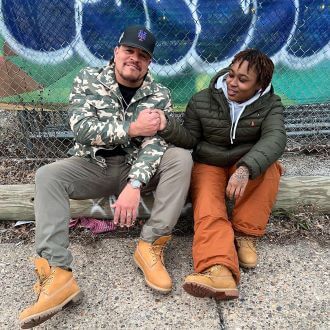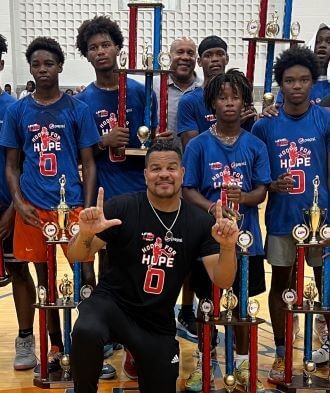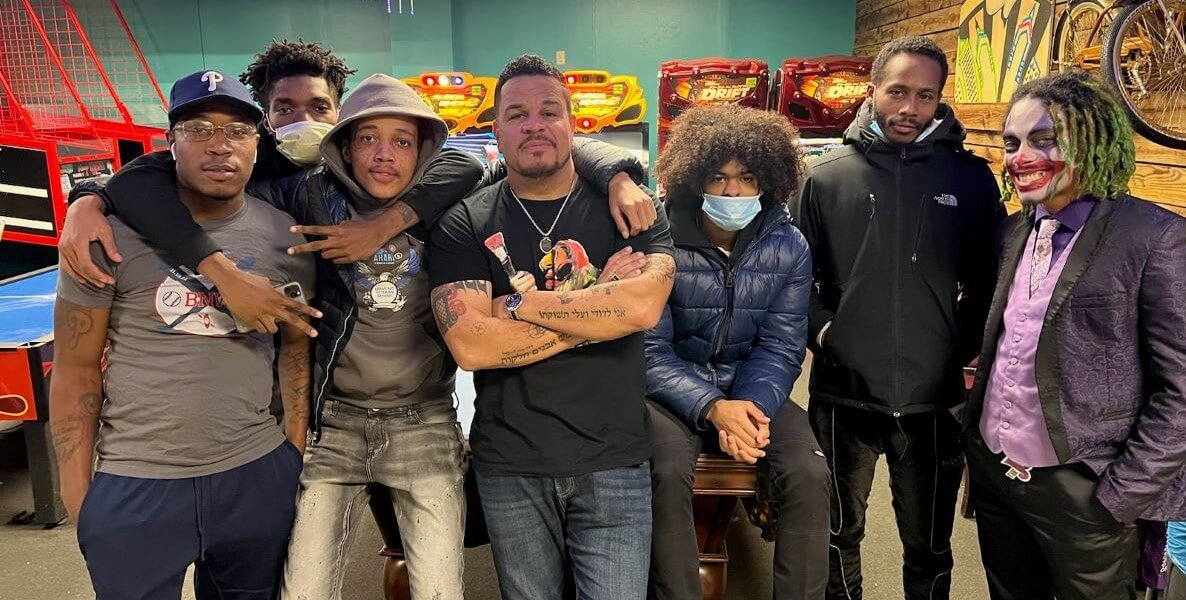In the world of gaming, leveling up is an iterative event that signals progress and empowerment. It’s one of the foundational experiences of gaming, and has become conventional as a concept in our everyday discourse. Level Up Philly has tapped into the deep sense of the phrase and applies it in the work and ministries associated with the organization and its charismatic founder, Pastor Aaron Campbell.
“Level Up has always been my mission,” Campbell says. Founded in 2018, Level Up’s work began over 20 years ago, when Campbell made his own radical conversion to Christianity from a double life as an Ivy Leaguer and a low-level hustler in Hell’s Kitchen.
He founded his church in his living room, in his home near 48th and Larchwood streets, over 22 years ago. That church has grown and is now more prominently known as Antioch Christian Fellowship. In some ways, Level Up and Antioch are inextricably linked. They are in the same building (4721 Chestnut Street) and led by Campbell with the ministerial overlap of a Venn diagram. But Level-Up’s mission doesn’t require a religious conversion. Instead, it projects a set of fundamental principles into the lives of some of the most vulnerable children in Philadelphia.
Level-Up is changing the lives of young people — sometimes one meal, one move, and/or one video game at a time.
Talking with Pastor Campbell about this work is a compelling experience. His enthusiasm is contagious and his mission-driven sense of purpose feels indefatigable. “We call it Level Up because we meet each young person wherever they are in life,” he says. “We help them level up to their next stage of success.”
Level Up hosts high-school-aged and young adult people on Tuesday and Thursday afternoons-evenings, for a hot meal, games and entertainment, tutoring, job prep, mentoring, counseling — and just a quiet, safe space to be. Campbell says an average of 375 teens from 55 different schools attend the program each week.
Level Up’s impact has been lauded by City, civic and religious leaders; it’s also been recognized by both local and national media. Last year, the group got a $300,000 grant from the state. But nothing presents the significance of Level-Up’s mission/work better than the stories of young people for whom Level Up can be the difference between life and death on any given day in the streets of Philadelphia.
Campbell touts “Pebbles” as an example: In 2022, the young woman was shot near the drug-infested corner of Kensington and Allegheny avenues; she then became homeless, before Campbell gave her a room in a three-bedroom “Level Up house.” In October, she went with Campbell to share her story with Mayor Kenney and relate firsthand how gun violence is affecting the city’s youth — a tale she would not have been able to share if not for her connection to Level Up.
And he praises another young woman, Yan, who first went to Level Up three years ago, after a stint in prison. She “never smiled,” Campbell says — a sign, perhaps, of the trauma she experienced. Late last year, with Level Up’s help, she achieved her welding certification and is now looking for work in the field, with its family-sustaining salaries.

Young people like Pebbles and Yan know materially what some of us only know in theory: that real community — love, fellowship, and personal edification — are the best tools for defense in an ultra-violent world.
The institutional and systemic alienation of young people through the erosion of the city’s residential infrastructure, easy access to guns, an underfunded public education system, and abject/concentrated poverty are all powerful forces against which Level-Up positions itself on the frontlines. Level-Up is changing the lives of young people — sometimes one meal, one move, and/or one video game at a time.
“They come from Frankford; they come from Kensington and Allegheny,” Campbell tells me. “They come from Tasker Street in South Philly, they come from Strawberry Mansion, 16th and Lehigh. We literally have every ‘hood and we teach them anti-violence and anti-retaliation.”
From side hustle to life mission
Campbell’s upbringing just outside of Newark, NJ put him in a unique position. He matriculated and graduated from the University of Pennsylvania, but he continued to keep a foot in the ‘hood through his menial work in Hell’s Kitchen. There he was adopted by a “seasoned crime family” who taught him how to navigate the undercurrents of Hell’s Kitchen. Campbell’s mentors were loan sharks, but he didn’t get directly involved with their business.
Instead, while still a Penn undergrad, he figured out his own side hustles under their tutelage. According to him, these were “crimes of choice”, and as he grew up and into his ministerial mission, he realized the emptiness of material gains at the expense of community. He says as much in his own memoir, Eyes that Seen Plenty.
The impetus for Level-Up came from Campbell’s desire to work with youth (even when he was one) in order to help them see past the barriers and the bullshit that society (and religion) too often present to them. For Campbell, religion was too much rhetoric and not enough action, so he founded and developed a church (and its attendant ministries) that were designed to redress the criticisms of younger generations through community presence and direct action. His life was the record of witnessing that drove the mission of Level Up: Young people need space, place and direct engagement to wrestle with the world in which we have put them.
Campbell argues that young people do not have to have a particular talent (in athletics or in academics) in order to have “intrinsic value” to our communities. “We tell them, you have intrinsic value now,” Campbell says. They do this in multiple ways.
Says Campbell, “We’re showing people this is the answer to our city’s problem.”
Level-Up is one of the city’s largest after-school programs serving hundreds of students on a weekly basis. They have implemented the L.I.F.E. approach to their work: L (Locate) in their West Philly space; I (Identify) issues each young person has, through a questionnaire they fill out before being served a meal; F (Fortify) them to solve those issues; E (Exemplify) the work by showing off their young people to the world.
The programming includes gourmet meals (which Campbell starts prepping at 10:30 am each Tuesday and Thursday); access to an arcade and state-of-the-art video games; dance competitions; and visual art therapy designed to encourage young people to express repressed emotional responses to their environment. Young people have access to mentors, social workers, defense lawyers as needed, tutors and a range of academic support systems and incentive-based educational opportunities, from the basics to college prep and career planning.
Many of the young people attend regularly, while others may drop in (or out) over time. Everyone is searched before entry — no weapons of any kind allowed. The goal is to encourage them to leave the violence of their lives behind when they enter into the Level Up space.
Level-Up has a cash-for-grades program that is not contingent on necessarily getting good grades. It’s about creative incentives for children to share their grades, to become proud of their work and, of course, to engage them and show them their intrinsic value.

The Level Up team consists of counselors, professors, mentors, pastors/religious leaders, social workers, math specialists, and more, fielding some 15 to 20 professionals to serve and support the young people who enter their doors on any given week.
According to Campbell, some of Level-Up’s young people traverse the very dangerous neighborhoods they fear most just to get to what has become an oasis from the violence. “We take guns off kids” he says. “Last night we had a potential shootout,” he tells me. We have to check book bags; guns are getting hidden in alleyways because kids know they can’t bring them in. We have to follow kids outside to make sure if they’re arguing they don’t go get their gun. But kids are telling us, I have to get through two neighborhoods that want to kill me just because of the neighborhood that I’m from … just to get to Level Up.”
Tragedies — and glimmers of hope
Campbell’s leadership on the frontlines with the children/young people of Philadelphia is rife with war stories and an unfortunate but consistent loss of life, even for those folks who regularly attend Level Up events. One of Campbell’s closest mentees — 20-year-old Rasheem Brown — was murdered in the Cobbs Creek neighborhood of West Philadelphia on December 23, the eighth young person from his group who was shot in 2022. He had been a committed participant in the Level Up program for over four years. Campbell tells me he was a magnetic young man, a dancer with the well-known Dollar Boyz, who was painfully aware of the bullying and fear that often leads to young people toting guns and shooting each other.
“It’s hopelessness; it’s fear — even the toughest guy will tell you,” Campbell says. “And then social media; social media fosters envy and a deep jealousy. It’s all of those elements. And then lastly, it’s just feeling abandoned.”
Young people like Pebbles and Yan know materially what some of us only know in theory: that real community — love, fellowship, and personal edification — are the best tools for defense in an ultra-violent world.
Campbell describes the young people as feeling like a pariah generation, like the world in which they live is ruthless and devoid of adult guidance. This resonates. So often, young people are accused of being nihilistic — rejecting all moral (and religious) principles. But the reality for some young people in Philadelphia is that they are trying to survive a nihilistic reality propped up by the challenges that Campbell confronts them with on a regular basis.
Campbell has plans to scale up the Level-Up program. Part of the plan is to establish Level-Up as a replicable program for other American cities with comparable problems/challenges. “We’re bringing life/L.I.F.E.,” Campbell says. “We’re changing countless lives.”
It is deep into one of our interviews that Pastor Campbell tells me the story about a family, a single mother with five children. Her son has been going to Level-Up programming for four years and is a senior at West Philadelphia High School. Through Level-Up’s cash-for-grades program, this young man progressed from a C/D student to an honor roll student. He and his family lived in West Park Housing Projects, but fell on difficult times and became houseless. They were split up but eventually started to stay at a homeless shelter in an attempt to keep the family together.
“They left it [the shelter] because mice were biting his younger siblings all night; so he would wake up with mouse bites,” Campbell says. In the spring of 2022, after two of this young man’s sisters were shot (one aged 20, the other 15 — both survived), Level-Up went to work. Now all of his siblings attend programs, and Pastor Campbell worked with the mother to place the family in a three-bedroom home — “the level-up house.”
“We’re teaching the mom economic self-sufficiency,” Campbell says. “We’re working with her on the rent. We pay the rent now, but we’re teaching her how to run a home, letting the whole family heal together and [the young man] has just gotten into five colleges. So in the midst of all of this, his sisters have both healed. They’re both doing well and healing from being victims of gun violence.” They all now have “a beautiful home.” Level Up isn’t the total antidote to Philadelphia’s neighborhood violence challenges, but it is certainly one part of the solution.
Says Campbell, “We’re showing people this is the answer to our city’s problem.”
![]() MORE SOLUTIONS FOR PHILLY’S GUNS AND VIOLENCE
MORE SOLUTIONS FOR PHILLY’S GUNS AND VIOLENCE
Pastor Campbell, center, with youth in the Level Up program



